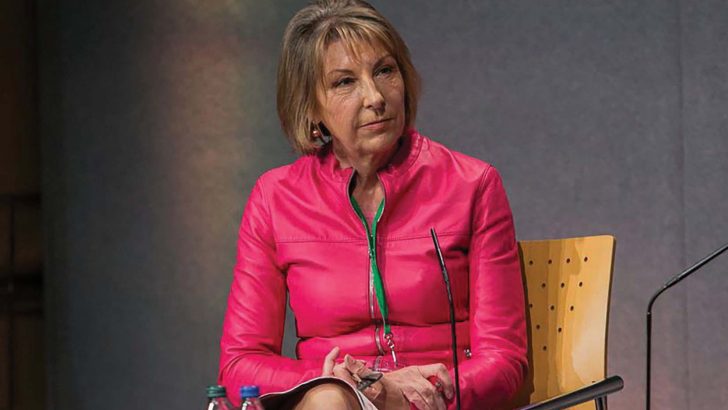Crossing lines that shouldn’t be crossed has caused unnecessary conflict and division, has fractured social discourse and has damaged our trust in institutions and people.
When a journalist is interviewed on a controversial topic, you expect them at least to try and be impartial, even if you know where their sympathies lie. My admiration of their professionalism grows when I see them keeping that neutrality despite their strong opinions. I hoped that might happen when journalist Susan McKay was interviewed by Áine Lawlor on Morning Ireland (RTÉ Radio One, Thursday). I was disappointed. She was discussing the current abortion situation in the North and was hugely partisan, coming across as more of a campaigner. Even worse, she wasn’t challenged on her views. You’d think a pro-life perspective didn’t even exist – it is increasingly erased from public debate. The presenter described the situation – that in Northern Ireland abortion was “legal but not available”. Ms McKay showed her true colours when she described the current UK abortion regime as “very humane”! Surely that deserved a challenge, even something as minimal as “some would say that abortion is not humane”. Also disturbing was her dissatisfaction with distinctions being made in law between fatal and severe but non-fatal foetal ‘impairment’ – diagnosis was difficult (as pro-lifers have always argued but with different conclusions). She favoured having the option to terminate in both situations – no reference to any time limit. She was critical of Sinn Féin for not voting against a unionist motion to rule out that repulsive outcome. There was no challenge from the interviewer, no attempt to suggest that another viewpoint even existed.
Challenged
Later Áine Lawlor interviewed Sinn Féin’s leader in the North, deputy First Minister Michelle O’Neill. She was challenged – but on why she wasn’t more supportive of the move to broaden the grounds for abortion. It was the party position, she said, not to support abortion in cases of non-fatal foetal abnormality, so that North and South would be aligned. Judging by past experience I suspect it won’t be that long before this policy will be ‘evolved’ to suit. It has long seemed incongruous to me that Sinn Féin would support the British government in imposing abortion ‘services’ – what she euphemistically called ‘compassionate healthcare’.
Crossed
That same morning, on It Says in the Papers there were reports from The Irish Times of other lines being crossed – protests at the private houses of politicians and media figures, apparently by those opposed to Covid-19 vaccinations. Names of those targeted included Health Minister Stephen Donnelly and broadcasters Joe Duffy and Pat Kenny. If protests are to be made let them be made peacefully and respectfully at institutions or offices, away from private houses and families and even children who can understandably feel intimidated.
The problem is that activists feel that their cause is so righteous that crossing these lines is justified, with disregard for justice or wise judgement. Sometimes the temptation to cross lines is understandable to a degree. I find myself increasingly annoyed by Pat Kenny going on and on about ‘the unvaccinated’, as if they were ‘the walking dead’ or afflicted with leprosy. To me this comes across as demonisation and he’s not the only one at it. The presenters of current affairs programmes should be more neutral, teasing out the issues rather than teasing the protagonists. Recently he described those who argue against the vaccinations as “the crazies” – wholly inappropriate for a presenter. His position is a privilege and should not be used for flying personal kites, especially if divisive and inflammatory. On The Pat Kenny Show (Newstalk, Thursday), in a discussion with Stephen Donnelly, he was lecturing the minister – “tell the unvaccinated people – stay at home…why give them any quarter!” He likened it to the cocooning of the early days and clarified he was not talking about those who couldn’t take the vaccine for medical reasons, but thankfully the minister was still more in favour of engagement. I write all this as one who currently finds the case for vaccination compelling.
Finally, it was ground-breaking to have Pope Francis deliver Thought for the Day (BBC Radio 4, Friday). He pursued his theme of creation and our ‘common home’, but while acknowledging the challenges of climate change it was positive and forward-looking. He saw “a brighter horizon” and hoped the COP26 gathering would bring “concrete hope to future generations”.
Pick of the week
Mass
RTE One Sunday November 7, 11.00am
Fr Séamus Madigan, Head Chaplain of the Irish Defence Forces, celebrates Mass with the Arbour Hill faith community. Music by Susan, Sally and Claire Keane, with piper Private Seán Maher.
Scotland’s Sacred Islands With Ben Fogle
BBC One Sunday November 7, 11.30am
At the end of his spiritual journey across Scotland’s sacred isles, Ben Fogle meets Orthodox nun Mother Mary, who lives a solitary life of prayer and contemplation in this very remote place.
Film: Doubt
TG4 Monday November 8, 9.30pm
(2008) Starring Meryl Streep, Philip Seymour Hoffman and Amy Adams. Directed by John Patrick Shanley. A Catholic school principal questions a priest’s ambiguous relationship with a troubled young student.


 Brendan O’Regan
Brendan O’Regan Áine Lawlor didn’t challenge Susan McKay’s characterisation of the abortion issue in the North.
Áine Lawlor didn’t challenge Susan McKay’s characterisation of the abortion issue in the North.